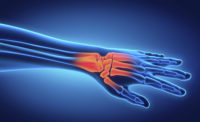Green armbands, weekly assessments ID fall risk patients

Turks and Caicos Islands Hospital (Turks and Caicos is an archipelago of 40 low-lying coral islands in the Atlantic Ocean, a British Overseas Territory southeast of the Bahamas) has implemented a revised program of best practices in fall prevention to help minimize the incidence and severity of falls.
Fall prevention expert Elaine Fockler RN, based in Canada, has updated and customized the internal program and conducted various training sessions. The sessions included education on the tools and interventions used to assess and reduce the risk of falls and injury from falls in adults and children.
Professional disciplines beyond nursing staff including rehabilitation services, pharmacy, physicians and nonclinical staff have also been sensitized. A total of 75 clinical and 38 facilities management staff have received training.
Mechanisms have been developed for departments to identify and communicate if a patient is at high risk for falls. Every Friday will be observed as “Fall Prevention Friday” at TCI Hospital to ensure every in-patient receives a fall risk assessment. This initiative will be enforced in addition to the completion of fall risk assessments upon admission, upon unit transfer if there is a significant change in the patients’ status and post fall.
Green armbands will be applied to all patients who are identified to be at risk of a fall. In-patients found to be at risk will receive a green triangle placed on the door of their assigned room and above their bed. Patients in the Operating Room will have green socks applied. These green identifiers will alert hospital staff members that the patient is at risk of falling and requires special assistance.
Most falls are caused by the interaction of multiple risk factors. The more risk factors a person has, the greater their chances of falling. Healthcare providers and caregivers at home can lower a person’s risk by reducing or minimizing that individual’s risk factors and environmental hazards.
Persons who are more likely to fall may experience risk factors such advanced age, gait & balance problems, impairments such as poor vision or muscle weakness, postural hypotension, chronic conditions including arthritis, diabetes, stroke, Parkinson’s, incontinence and dementia. The revised program will help to reduce the social, psychological and economic impact of falls on individuals, families and the community.
Source: interHealthCanada
Looking for a reprint of this article?
From high-res PDFs to custom plaques, order your copy today!






